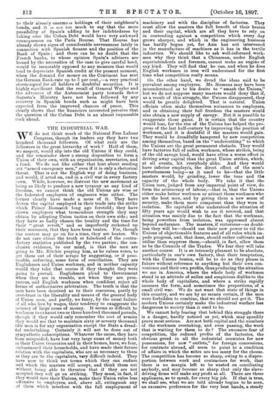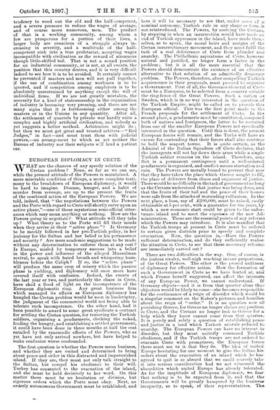THE INDUSTRIAL WAR.
WE do not think much of the National Free Labour Congress, though its leaders say they have two hundred thousand followers. Of what rank are the followers in the great hierarchy of work ? Half of them, we suspect, would slip into the old Unions if they could, and the remainder show a strong disposition to form a Union of their own, with an organisation, secretaries, and a fund. We do not like either that hint about sending out "armed emergency men," even if it is only a rhetorical threat. That is not the English way of doing business, and would, if acted on, end in a civil war in every factory town. While, however, we distrust the new movement as being as likely to produce a new tyranny as any kind of freedom, we cannot think the old Unions are wise or the federated employers of engineers wise either. The ' former clearly have made a mess of it. They have driven the capital employed in their trade into the strike which Prince Bismarck long ago foretold ; they have shown employers what tremendous strength they may obtain by adopting Union tactics on their own side ; and they have so badly chosen the locality and the time for their "great revolt," and so imperfectly reckoned up their resources, that they have been beaten. For, though the contest may go on for a time, they are beaten. We do not care about the truth or falsehood of the contra- dictory statistics published by the two parties ; the con- clusive evidence, to our mind, is that the men are going to Mr. Ritchie praying him, as he values votes, to get them out of their scrape by suggesting, or if prac- ticable, enforcing, some form of conciliation. They are • Englishmen and Union workmen, and in neither capacity would they take that course if they thought they were going to prevail. Englishmen plead to Government when they are in trouble, not when they are pros- perous, and English workmen when confident reject all forms of authoritative arbitration. The truth is that the men have been deceived as to their resources, partly by over-trust in the liberality and means of the general body of Union men, and partly, we fancy, by the usual failure of all who live by wages, their tendency to exaggerate the potency of large sums of money. It seems so difficult to workmen to exhaust two or three hundred thousand pounds, though if they would only remember the cost of armies they would see that to maintain sixty or seventy thousand idle men is for any organisation except the State a dread- u1 undertaking. Certainly it will not be done out of sympathetic subscriptions. Whatever the cause, they have been misguided, have lost very large sums of money both in their Union treasuries and in their homes, have, we fear, embarrassed their households, and have made their future relation with the capitalists, who are as necessary to them as they are to the capitalists, very difficult indeed. They have now to think out terms which they can endure and which the masters will accept, and think them out without being able to threaten that if they are not • accepted they will go on striking. They must, in fact, if • they would save their Unions, make their Union rules less offensive to employers, and, above all, extinguish any of them which interfere with the full employment of machinery and with the discipline of factories. They must allow the masters the full benefit of their brains and their capital, which are all they have to rely on in contending against a competition which every day grows sharper, and which in the engineering business has hardly begun yet, for Asia has not intervened in the manufacture of machines as it has in the textile industries. We should like to ask well-informed work- men why they think that a Chinaman, under English superintendents and foremen, cannot make an engine of any kind. They will find that he can, and when he does English workmen in iron will understand for the first time what competition really means.
On the other hand, we dread the ideas said to be prevalent among employers. Mr. Siemens may have been misunderstood as to his desire to "smash the Unions," but we do not suppose many masters would deny that if, as a result of this struggle, the Unions disappeared, they would be greatly delighted. That is natural. Union officials often make themselves nuisances to employers, and in obtaining their full freedom the masters would also obtain a new supply of energy. But it is possible to exaggerate those gains. It is certain that the country would lose, for the rise of the Unions has helped the pro- gress of the last half-century by improving the position of workmen, and it is doubtful if the masters would gain. They would be dreadfully hampered by new competition among themselves, based on the " undercutting " to which the Unions are the great permanent obstacle. They would have factories full of sullen workmen, whose strikes, being of the old savage kind, would have often a worse effect in driving away capital than the great Union strikes, which, at all events, hit everybody alike. And they would have inferior employes, the direct effect of the men's powerlessness being—as it used to be—that the little masters would, by grinding, lower the tone and the capacity of the whole body. We take it that the Union men, judged from any impartial point of view, do form the aristocracy of labour,—that is, that the Unions either make better workmen or attract those workmen who are the best men, and by giving them a new sense of security, make them more competent than they were in isolation. No capitalist who understood the situation of fifty years ago would wish to see it revived, and that situation was mainly due to the fact that the workman, being powerless from isolation, was oppressed almost beyond endurance. The masters, if victorious—as doubt- less they will be—should use their new power to rid the Unions of objectionable features and of all rules which im- pede progress, and, that done, should rather cultivate and utilise than suppress them,—should, in fact, allow them to be the Councils of the Trades. We fear they will take another course. It is so intensely pleasant to be absolute, particularly in one's own factory, that their temptation, with the Unions beaten, will be to do as they please in future without reference to anything but their own con- venience and their own profits, thus producing the situation we see in America, where the whole body of workmen stand in an attitude of sullen and suspicious dislike to the whole body of capitalists, and where a strike rapidly assumes the form, and sometimes the proportions, of a small civil war. We do not want that state of things in this country, and we are by no means certain, if the men were forbidden to combine, that we should not get it. The modern Unions certainly make the industrial warfare less dangerous to society than it used to be.
We cannot help fearing that behind this struggle there is a danger, hardly noticed as yet, which may speedily prove most serious. Are not both capital and the numbers of the workmen overtaking, and even passing, the work that is waiting for them to do ? The excessive fear of competition, the reduced profits of the factories, the obvious greed in all the industrial countries for new possessions, for new "outlets," for foreign concessions, for contracts abroad, all seem to point to a condition of affairs in which the mites are too many for the cheese. The competition has become so sharp, owing to a dispro- portion between work and contractors for work, that there is no margin left to be wasted on conciliating anybody, and may become so sharp that only the slave- driving firms will make any profit at all. There are three applicants, so to speak, for every big job. If that is true, we shall see, what we are told already begins to be seen, an excessive preference for the very best hands, a steady tendency to weed out the old and the half-competent, and a severe pressure to reduce the wages of average, and of course more numerous, men. The product of that is a working community, among whom a few are prosperous for a portion of their lives, a larger body are conscious of a struggle always in- creasing in severity, and a multitude of the half- competent sink into a true proletariat, accepting wages incompatible with civilisation as the reward of strenuous though little-skilled toil. That is not a sound position for an industrial community, or is not, at all events, the position that this country desires, and it is very difficult indeed to see how it is to be avoided. It certainly cannot be prevented if masters and men will not pull together, if the use of combination among workmen is to be ignored, and if competition among employers is to be absolutely unrestrained by anything except the will of individual firms. If we are not greatly mistaken, the necessity for a kind of statesmanship in the organisation of industry is becoming very pressing, and there are not many signs that it is forthcoming either among the masters or in the Unions in any quantity. After all, the settlement of quarrels by private war hardly suits a complex and highly artificial civilisation, and nobody as yet suggests a better method. Arbitration might do ; but then we must get great and trusted arbiters—" Red Judges," in fact—and must trust them with judicial powers,—an arrangement to which as yet neither the Barons of industry nor their subjects w:11 lend a patient ear.







































 Previous page
Previous page